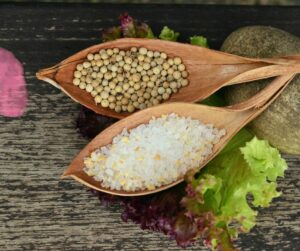Am I the only one who is extra careful when purchasing fruits of recent? Their texture looks unnatural and the taste feels fabricated. This is as a result of artificial ripening of the fruits during which a susbstance known as calcium carbide is usually utilized. In this article, we will learn the harmful effects of this process , how to identify fruits ripened by calcium carbide and safer alternatives in fruit ripening.
What is Calcium Carbide?
Calcium carbide is a chemical compound that has been used in certain regions to artificially ripen fruits, especially bananas.
Carbide ripening has legitimate uses in the industrial setting for carbide lamps, steel making, production of acetylene gas, its use as a ripening agent is highly discouraged and illegal in most countries.
Harmful Effects of Calcium Carbide Fruit Ripening
Here are some of the reasons why calcium carbide is considered harmful when used in ripening fruit:
- Production of acetylene gas: When calcium carbide comes into contact with moisture, it produces acetylene gas, which is a potent and highly flammable gas. This gas can cause explosions and poses a serious risk to workers handling the chemical.
- Presence of impurities: Calcium carbide used for fruit ripening purposes often contains impurities such as arsenic and phosphorus. These substances have the ability to form strong free radicals in the body which pose serious health risks to consumers.
- Health hazards: Consumption of fruits ripened with calcium carbide can lead to various health problems. Acetylene gas can cause respiratory issues, eye irritation, coughing, and shortness of breath. Additionally, the presence of toxic impurities can lead to gastrointestinal problems, skin rashes. Arsenic has been classified by the EPA as a carcinogen; what this means is that long term consumption of fruits ripened with carbide could increase the risks of having cancer.
- Altered nutritional value: Fruits ripened with calcium carbide may have altered nutritional profiles. A distorted natural ripening process can affect the natural synthesis of vitamins, minerals, and antioxidants in fruits, leading to a reduction in their nutritional value.
- Flavor and quality degradation: Fruits artificially ripened with calcium carbide may have an unnatural taste, texture, color and aroma. The chemical can affect the natural ripening process, resulting in poor quality fruits that may not meet consumer expectations.
How to Identify Fruits Ripened by Calcium Carbide
Paying a little bit more attention when buying fruits can help to protect your health and that of your loved ones.
Here are some potential features of fruits ripened with calcium carbide:
- Uniform color change: These artificially ripened fruits may exhibit a uniform color change on the surface. For example, bananas ripened this way may have a uniformly yellow appearance, even though the internal ripening processes may not have occurred fully.
- Accelerated ripening: Calcium carbide artificially accelerates the ripening process, leading to fruits that appear ripe on the outside while the internal ripening processes may not have completed naturally. As a result, the fruit’s texture, flavor, and aroma may be compromised.
- Uneven ripening: In some cases, these fruits may exhibit uneven ripening. This means that certain parts of the fruit may ripen more quickly than others, leading to inconsistent texture and taste throughout the fruit.
- Altered taste and aroma: Fruits ripened with calcium carbide may have an unnatural taste and aroma. The artificial ripening process can affect the fruit’s natural sugar content, flavor compounds, and volatile aromas, resulting in a different taste profile than that of naturally ripened fruits.
- Reduced shelf life: Fruits ripened with calcium carbide often have a shorter shelf life compared to naturally ripened fruits. The hastened ripening process can lead to faster deterioration and increased susceptibility to spoilage.
It’s important to note that the color of bananas is not necessarily an indicator of their ripeness or taste as different varieties may have different colors. Educating yourself on the different varieties of banana can also give you a greater advantage when buying for consumption.
Healthy Ways to Ripen Fruits
There are several healthy and natural ways to ripen fruits without the use of artificial substances like calcium carbide. Here are some alternative and safer methods you can use to ripen fruits safely:
- Time and patience: Many fruits will naturally ripen over time if left at room temperature. Place unripe fruits in a dark and well-ventilated area away from direct sunlight and let them ripen naturally. This process may take several days or longer, depending on the fruit.
- Ethylene gas: Ethylene is a natural plant hormone that promotes fruit ripening. You can use ethylene-producing fruits, such as bananas or apples, to speed up the ripening process of other fruits. Place the unripe fruits in a paper bag along with an ethylene-producing fruit and close the bag loosely. The ethylene gas released by the ripe fruit will help ripen the other fruits more quickly.
- Warmth: Providing a slightly warmer environment can help accelerate the ripening process. However, avoid extreme temperatures or exposing the fruits to direct sunlight, as this can lead to over-ripening or spoilage.
- Use of a ripe fruit bowl: Create a ripe fruit bowl by placing a few ripe fruits together with the unripe ones. The ripe fruits release ethylene gas, which can help ripen the neighboring fruits naturally.
- Brown paper bag method: This method works well for certain fruits like avocados, pears, and tomatoes. Place the unripe fruit inside a brown paper bag and loosely fold the top. The bag traps the ethylene gas released by the fruit, aiding in the ripening process.
- Strict regulation by the government may be needed to ensure safe methods of ripening and enforce banning of calcium carbide in fruit ripening.
Remember to monitor the fruits regularly to prevent over-ripening or spoilage. It’s also important to note that some fruits, like citrus fruits and berries, do not continue to ripen significantly after being harvested, so it’s best to consume them when they are fully ripe and fresh.
As much as possible do consume fruits that have been ripened naturally or ripened using safe and regulated methods. Another option is to purchase directly from the farmers, it might take a little bit more effort, but it should be safer.













